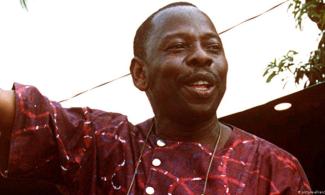
The mass‐based social movement organisation of the indigenous Ogoni people of Central Niger Delta said reviewing the unjust execution of nine Ogonis in 1995 will give room for true reconciliation in Ogoni land.
The Movement for the Survival of the Ogoni People (MOSOP) has called for a review of the hanging of environmental activist, Ken Saro-Wiwa and eight others by the Nigerian government in 1995.
The mass‐based social movement organisation of the indigenous Ogoni people of Central Niger Delta said reviewing the unjust execution of nine Ogonis in 1995 will give room for true reconciliation in Ogoni land.

Saro-Wiwa, a playwright, environmental activist and Ogoni leader was executed by the regime of the late Gen. Sani Abacha.
Saro-Wiwa and eight other Ogoni leaders were tried by a secret military tribunal and executed by hanging on November 10, 1995, a tragic end to their non-violent campaign against the Royal Dutch Shell Company and the Nigerian government over the pollution of Ogoniland through oil exploitation.
Saro-Wiwa and the other eight Ogoni leaders were accused of being responsible for the murder of five Ogoni chiefs at a pro-government meeting.
The other Ogoni leaders executed along with Saro-Wiwa were Saturday Dobee, Nordu Eawo, Daniel Gbooko, Paul Levera, Felix Nuate, Baribor Bera, Barinem Kiobel, and John Kpuine.
The group also reiterated its commitment to Ogoni development through the implementation of the Ogoni Development Authority.
The Central Committee of MOSOP at its meeting in Giokoo, Gokana local government area on Thursday unanimously expressed the organisation's willingness and commitment to promoting the implementation of the proposed development plan.
The meeting which was presided over by the president of MOSOP, Fegalo Nsuke, was called to assess the state of the struggle and review MOSOP's position on critical issues including oil resumption and development in Ogoni.
This was disclosed in a statement signed by Alex Akori,
Secretary-General of MOSOP and dated Sunday, April 3, 2022.
According to the statement, Nsuke said the Ogoni struggle was on course and would certainly achieve its purpose.
"We have recovered our struggle and it is strongly on course and I am confident that the people are able to keep and preserve it until our dreams are achieved," he said.
"It has been a collective, grassroots struggle and the gains should be for the people and not for some few and we will resist every attempt to crystallise our pains, sacrifices, wounds and deaths into the pockets of some few individuals," Nsuke told the Central Committee.
Shortly after addressing the Central Committee, the MOSOP President addressed a MOSOP Congress in Bera, also in the Gokana local government area where he called on the Nigerian authorities to encourage true reconciliation in Ogoni by reviewing the unjust execution of nine Ogonis in 1995. He said addressing the 1995 saga will help build goodwill for the government and help Ogonis to reintegrate into the Nigerian system.
Nsuke noted that to date, some Ogonis are still refugees in foreign lands due to fear of possible persecution should they return to Nigeria.
On the resumption of oil mining in Ogoni, the MOSOP President said those preaching that there should be a total 'no to oil production' in Ogoni were not in tune with the current realities in Ogoni and the position of MOSOP on the issue. He noted that the focus of MOSOP from inception had been development and that its position today favours a negotiated entry that guarantees the interest of the Ogoni people in any oil resumption deal.
The statement reads in part, "If we are talking of development, it requires money and so we can't be completely against oil production. What we should be talking about is that there should be a negotiation to guarantee the interest of the Ogoni people in any deal that is reached.
"In essence, we want development and the money from oil has to power that development so we cannot be completely opposed to oil production. We should be interested in a negotiated entry that will end decades of conflicts and killings in Ogoni over oil."
He said MOSOP launched the Ogoni campaign which has become popularly known as the Ogoni struggle in response to underdevelopment despite the huge natural resource exploitation which had strong impact on the people.
Nsuke advised the government to stop attempts to cause crises in Ogoni through its current backdoor moves to fund mushroom groups who masquerade as Ogoni organisations, noting that MOSOP will mobilise a strong resistance against every attempt to short-change the interest of the Ogoni people through the creation of government-sponsored versions of the movement.
The MOSOP President pledged MOSOP's commitment and willingness to continue engagement with relevant authorities to facilitate the resolution of the lingering Ogoni problem in the interest of all parties.